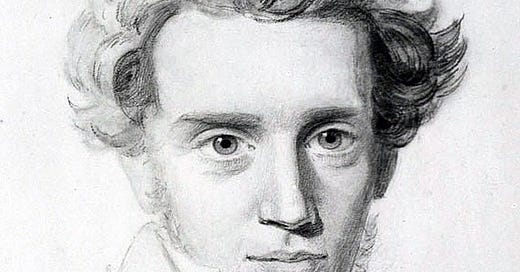Why Kierkegaard’s “The King and the Maiden” Is the Ultimate Existential Love Story
What can philosophy teach us about love that transcends power?
Questions
Is true freedom found in the ability to choose despite overwhelming doubt or uncertainty?
Can love be authentic if it is not freely chosen?
What does it mean to sacrifice your power for love?
Søren Kierkegaard (1813-1855)
The Problem
Søren Kierkegaard’s “The King and the Maiden” is a profound allegory of love, identity and the tension between power and authenticity. The story centres around a king, revered for his immense power, who falls in love with a humble maiden. However, the chasm between them is vast: to the maiden, the king’s royal status is a barrier. If the king were to ask for her hand in marriage, she would not be able to love him - his position of power and authority would overshadow any affection, making her acceptance of his proposal a response driven by fear, rather than by true love or the freedom to choose.
The Solution
In response to this, the king makes a radical choice: he decides to take on the disguise of a common peasant. He sheds his royal identity, his wealth, and his power, presenting himself as an ordinary man with no titles or authority. By doing so, he hopes to approach the maiden not as a king, but as an equal, offering her the decision to love him that is free from the trappings of his status. Arguably, this act of self-sacrifice, of stepping into vulnerability, is an ultimate demonstration of what it means to love authentically, with nothing to gain and everything to lose.
Through this gesture, the king asks for nothing but the maiden’s genuine affection. He gives up his throne and his kingdom to create the possibility of a pure, untainted relationship. It is only by relinquishing the external status of power that he hopes to be seen and loved for who he truly is.
The Existential Twist
Now for the existential twist. Many Christian philosophers over the years have seen this story from another, deeper and existential angle. Continuing the thought experiment: if God were to reveal Himself in a terrifying flash of lightning, with such undeniable force that there was no room for doubt in our minds, if He appeared to us in all His glory and power, would we still have the freedom to choose whether to accept Him? In the overwhelming presence of such certainty, would our choice be authentic, or would it merely be the inevitable response to an undeniable force?
The question then becomes: can true freedom and love exist in the presence of absolute and undeniable power?
Would we be able to choose God freely or would our response be nothing more than obedience to a force too great to resist?
Kierkegaard’s story, when placed against this thought experiment, suggests that true freedom, the freedom to love authentically, can only exist in the absence of coercion. Many have noted the similarity between the king and God; perhaps, like the king, God too chooses to reveal Himself not in the overwhelming flash of power, but in a way that invites choice. This would suggest that true love, after all, is not something that can be forced, but something we must choose, freely and willingly.





